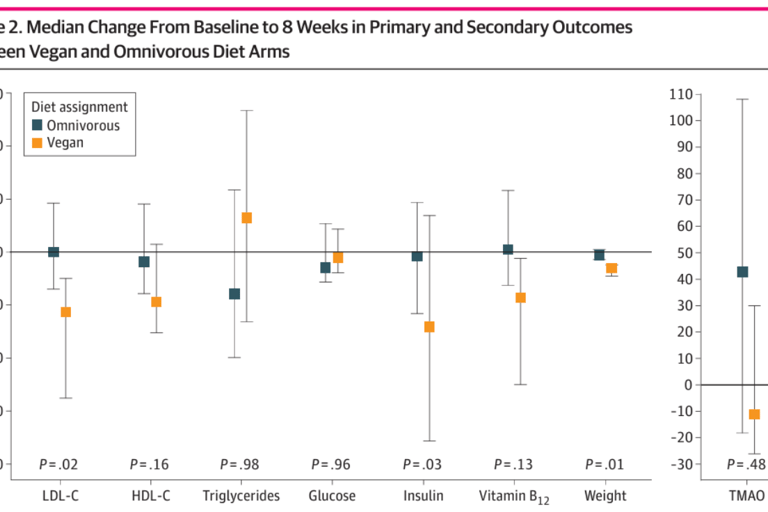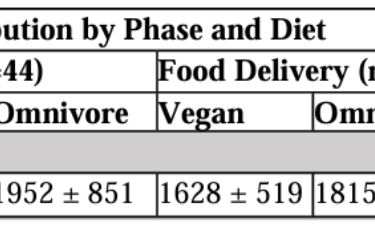OUT NOW: 8 WEEK TRANSFORMATION PROGRAM
You are what you digest, NOT what you eat!
Breaking down this intriguing false statement made by a Netflix documentary funded by companies with an interest in plant-based products.
NUTRITION
3/9/20247 min read


Summary
Breaking down this intriguing false statement made by a Netflix documentary funded by companies with an interest in plant-based products.
As a person who has been a competing athlete for the biggest part of his life and puts a person's health above everything, I would like to shine a non-biased light on this topic. I have been fascinated by nutrition and the importance of food and its relation to overall health for a very long time. As an athlete, I have been fine-tuning my diet, researching nutrition, and trying different diets for more than 20 years. Recently, I weighed in at 99.8 kg with a modest body fat percentage of 14%. My height? 185 cm. This is something none of these researchers, who claim to know something about food, has ever accomplished.
The Complexity of Defining a Healthy Diet
In an era where wellness trends come and go, the pursuit of a healthy diet seems more elusive than ever. The challenge lies not only in deciphering conflicting information but also in understanding the intricacies of our bodies. Here, we explore why defining a healthy diet is far from straightforward, touching upon topics such as gut health, the notion that "you are what you digest," the importance of balance, and the role of animal products.
Gut Health and Individual Variability
The human gut is a complex ecosystem teeming with trillions of microorganisms that play a crucial role in our overall health. Research into the gut microbiome has illuminated its influence on digestion, immunity, and even mental well-being. However, the composition of this microbiome varies significantly from person to person, making it challenging to prescribe a one-size-fits-all diet.
Moreover, recent studies suggest that individual responses to certain foods can vary widely. What may be beneficial for one person's gut flora could potentially be detrimental to another's. This inherent variability underscores the difficulty in defining a universally healthy diet. For example, I tried a plant-based diet for six weeks, and I have never felt so bad in my life.
You Are What You Digest, Not What You Eat
The adage "you are what you eat" overlooks a crucial aspect of digestion: absorption. Our bodies break down food into nutrients that are absorbed into the bloodstream and utilized for various bodily functions. Thus, it's not just about the foods we consume but also about how effectively we digest and assimilate them.
Factors such as gut health, enzyme activity, and overall metabolic function influence our ability to extract nutrients from food. This concept challenges the simplistic notion that the nutritional value of a food can be determined solely by its composition.
The Importance of Balance
While certain dietary patterns garner attention for their purported health benefits, balance remains key. Extremes, whether it be excessive restriction or indulgence, can lead to nutritional imbalances and adverse health effects. A healthy diet encompasses a variety of nutrient-dense foods, including fruits, vegetables, whole grains, lean proteins, and yes, even fats.
Striving for balance allows individuals to meet their unique nutritional needs while indulging in moderation. It also promotes sustainability, both in terms of personal health and environmental impact.
The Role of Animal Products
Amidst debates surrounding plant-based diets, it's essential to acknowledge the nutritional value of animal products. Meat, poultry, fish, eggs, and dairy provide vital nutrients such as protein, iron, zinc, and B vitamins. For some individuals, especially those with certain dietary restrictions or medical conditions, these nutrients are best obtained from animal sources.
While plant-based diets can offer health benefits when properly planned, demonizing animal products ignores their nutritional contributions.
Navigating Bias in Nutrition Information
In an age of information overload, separating fact from fiction can be daunting. Biased documentaries and research studies funded by vested interests further muddy the waters. For instance, documentaries like "You Are What You Eat" on Netflix promote plant-based diets while conveniently overlooking evidence to the contrary.
It's essential to approach nutritional information critically, considering the source, methodology, and potential conflicts of interest. Consulting a qualified healthcare professional or registered dietitian without any bias can provide personalized guidance tailored to individual needs and preferences.
In conclusion, the quest for a healthy diet is fraught with complexity. From gut health and individual variability to the importance of balance and the role of animal products, numerous factors influence our dietary choices. Navigating this landscape requires a nuanced understanding of nutrition and a willingness to adapt based on evolving evidence. Ultimately, a healthy diet is not a rigid prescription but a dynamic journey toward optimal well-being.
How Misleading The Study In The Show Is Presented
The documentary on Netflix has sparked significant discussion around the benefits of vegan diets, particularly in contrast to omnivorous diets. The film prominently features a study suggesting that a vegan diet leads to improved cardiometabolic outcomes compared to an omnivorous diet. However, upon closer examination, the study's interpretation and the conclusions drawn in the documentary raise serious questions about their validity.
The study in question involved 22 sets of twins randomly assigned to either an omnivore or vegan diet for eight weeks. The results indicated that the vegan group experienced a statistically significant decrease in LDL cholesterol and weight loss compared to the omnivore group. However, the narrative portrayed in the documentary fails to acknowledge critical nuances and limitations within the study.
One of the primary flaws lies in the selective emphasis on positive outcomes while overlooking negative findings. While the vegan group did exhibit favorable changes in LDL cholesterol and weight, they also experienced adverse effects such as a decrease in Vitamin B12 levels, a reduction in HDL cholesterol, and an increase in triglycerides. These negative changes, though not statistically significant, indicate potential risks associated with a vegan diet.
Moreover, the caloric disparity between the two diet groups casts doubt on the validity of attributing observed effects solely to dietary composition. The vegan diet provided approximately 200 fewer calories than the omnivorous diet throughout the trial, making it challenging to isolate the impact of dietary components from calorie intake on cardiometabolic outcomes.
The documentary's assertion that a vegan diet is a "healthy alternative" overlooks crucial considerations, including the potential for vitamin deficiencies, particularly Vitamin B12, which is critical for brain function. Additionally, while the vegan group experienced weight loss, much of it comprised muscle loss, contrasting with the omnivore group's maintenance or gain of muscle mass, facilitated by higher protein intake.
Furthermore, ideological conflicts of interest raise concerns about potential biases in the study. The lead author has affiliations with Beyond Meat and espouses ideological convictions toward a plant-based diet, which may influence the interpretation of results.
Another notable limitation is the reliance on self-reported adherence, a method prone to inaccuracies and biases. Additionally, participants reported lower dietary satisfaction with the vegan diet suggesting potential challenges in long-term adherence, raising questions about the sustainability of such dietary patterns.
In summary, while the study presents intriguing findings regarding the effects of vegan diets on cardiometabolic health, its interpretation and subsequent portrayal in the documentary oversimplify complex dynamics and fail to adequately address critical limitations. Claims of a vegan diet being a superior alternative lack robust empirical support and overlook potential risks associated with nutritional deficiencies and adverse metabolic changes. As such, caution is warranted in advocating for the widespread adoption of vegan diets based on the findings of this study.
In conclusion, critical scrutiny of scientific research and media representations is essential to discerning the validity of claims and informing evidence-based dietary recommendations. The study's flaws highlight the need for comprehensive and nuanced evaluations of dietary interventions to ensure informed decision-making in healthcare and public health initiatives.
How The Show Mislead You
The show attempted to shed light on dietary patterns, particularly emphasizing the role of meat consumption and its purported impacts on health. However, upon closer examination, several glaring misconceptions and oversights emerged, challenging the narrative presented.
One of the key issues highlighted was the overemphasis on vegan alternatives, particularly in the realm of fake cheese, exemplified by the focus on Miyoko's, while other plant-based substitutes like fake burgers received comparatively less attention. This disproportionate portrayal detracts from a balanced discussion of dietary options and fails to provide viewers with a comprehensive understanding of plant-based alternatives.
Moreover, the docuseries often equated meat consumption with fast food, perpetuating the misconception that all meat-based meals are inherently unhealthy. This oversimplification overlooks the myriad ways in which meat can be incorporated into a balanced diet, alongside wholesome foods like vegetables and whole grains. A steak served with a side of salad and roasted broccoli bears little resemblance to a fast food burger meal with processed carbohydrates and unhealthy fats.
Historically, humans have consumed meat for thousands of years, yet it is the recent proliferation of ultra-processed junk foods that has coincided with the rise in lifestyle-related diseases such as type 2 diabetes and obesity. These hyper-palatable foods, rich in calories and devoid of nutritional value, have contributed to a departure from the whole foods consumed by our ancestors, raising questions about their role in modern health epidemics.
Contrary to anyone's belief, eliminating or drastically reducing meat from one's diet may not necessarily equate to improved health outcomes. Meat serves as a high-quality source of protein, essential fatty acids, and vital nutrients such as iron, vitamin B12, and zinc, which are often deficient in plant-based diets. This underscores the importance of prioritizing nutrient density and dietary diversity, rather than focusing solely on the exclusion of specific food groups.
Furthermore, the notion that protein-rich animal foods are inherently calorie-dense overlooks the satiating effect of protein, which can aid in weight management by promoting feelings of fullness and reducing overall calorie intake. A comparative analysis reveals that animal-sourced proteins such as seafood, chicken, and steak offer lower calorie options than certain plant-based alternatives like lentils and nuts, highlighting the importance of mindful food choices in achieving dietary goals.
Ultimately, navigating the complexities of nutrition requires a nuanced understanding of dietary patterns, individual preferences, and nutritional needs. Rather than subscribing to one-size-fits-all dietary recommendations, individuals should strive to cultivate a balanced approach that prioritizes whole, nutrient-dense foods while allowing for flexibility and moderation. By dispelling myths and embracing evidence-based dietary principles, we can empower ourselves to make informed choices that support long-term health and well-being.




